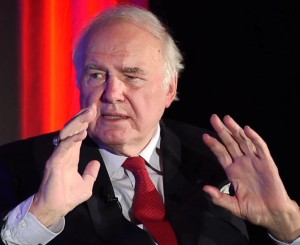 In part one we wrote about Jesus’ parable of the vineyard to show that God invested his creation with metaphysical capital. In this post we will elaborate on another kind of capital, moral capital.
In part one we wrote about Jesus’ parable of the vineyard to show that God invested his creation with metaphysical capital. In this post we will elaborate on another kind of capital, moral capital.
Michael Novak, the economist and economic philosopher, describes the need for a moral ecology, a systemic view of the relationship between a society’s moral practices and its economic health. We are not simply to do things right, we are to expend moral capital to do the right things. We are to do the good, not simply the pragmatic.
The landlord invested metaphysical, moral and physical capital (i.e. his land, skills and labor) to create the enterprise. Because of the moral capital he expected to fairly share the proceeds of the harvest with his tenants who worked and cared for the vineyard.
But the capital investment of the owner meant nothing to the tenants. They wanted all the proceeds for themselves. Jesus is exposing the absence of moral capital in the Jewish nation, especially in its leaders.
 Moral capital has become almost extinct in our day. We live in a world driven by atheism and its materialistic assumptions. Nature is all that is real. Economics, as practiced in communism and hedonistic capitalism, has been reduced to materialistic terms and values. Contrast that with the beautiful and comprehensive nature of biblical economics captured by the Greek word oikonomia, “stewardship of [God’s] house.” In fact, our English term economics is a biblical concept; it comes from oikonomia. When we read Genesis 1 and 2 through the lens of oikonomia we see new meaning in the creation story.
Moral capital has become almost extinct in our day. We live in a world driven by atheism and its materialistic assumptions. Nature is all that is real. Economics, as practiced in communism and hedonistic capitalism, has been reduced to materialistic terms and values. Contrast that with the beautiful and comprehensive nature of biblical economics captured by the Greek word oikonomia, “stewardship of [God’s] house.” In fact, our English term economics is a biblical concept; it comes from oikonomia. When we read Genesis 1 and 2 through the lens of oikonomia we see new meaning in the creation story.
God assigned the humans to steward the garden
God created the universe. He made our beautiful planet and its garden. He placed the first humans as stewards of the garden (Genesis 1:26-28). The first job description: live in the garden, work it and take care of it (Genesis 2:15). They and their descendants were to bring flourishing of the garden for all, to the glory of God. God, the Divine Imagination, may conceive out of spirit. Human imagination must begin with the materials of the primary creation to shape our secondary creations. The biblical worldview provides the fount for human creativity and entrepreneurship. We live in a real world, and we are the image of God, made to discover and create.
Genesis 1:26-28 reveals the cultural commission, God’s purpose for human beings on earth.
Then God said, “Let us make man in our image, after our likeness. And let them have dominion over the fish of the sea and over the birds of the heavens and over the livestock and over all the earth and over every creeping thing that creeps on the earth.”
So God created man in his own image,
in the image of God he created him;
male and female he created them.
And God blessed them. And God said to them, “Be fruitful and multiply and fill the earth and subdue it, and have dominion over the fish of the sea and over the birds of the heavens and over every living thing that moves on the earth.”
God invested the creation with moral capital
Note that God capitalized the garden with all that human beings would need for life. He then blessed them. The Hebrew word for bless is בָּרַךְ (bā·rǎḵ) and means “commend, i.e., speak words invoking divine favor, with the intent that the object will have favorable circumstances or state at a future time.” God commends the humans to the task for which He made them. He has provided the capital they will need for success in the enterprise He has assigned them: to be fruitful and multiply (form families) and to steward His creation.
As Michael Novak has so clearly said:
 Creation left to itself is incomplete, and humans are called to be co-creators with God, bringing forth the potentialities the Creator has hidden. Creation is full of secrets waiting to be discovered, riddles which human intelligence is expected by the Creator to unlock. The world did not spring from the hand of God as wealthy as humans might make it.
Creation left to itself is incomplete, and humans are called to be co-creators with God, bringing forth the potentialities the Creator has hidden. Creation is full of secrets waiting to be discovered, riddles which human intelligence is expected by the Creator to unlock. The world did not spring from the hand of God as wealthy as humans might make it.
When God finished his work of creation, it was perfect. His work was “finished” (Gen 2:1-2). But the humans’ work was only beginning. God’s intention was that human beings would be secondary creators, or co-creators, to take what God had made and be creative. He gave them what they needed to fulfill their purpose. He blessed them and capitalized them.
Metaphysical and moral capital are essential to human life
It is the intangible capital of the caput, metaphysical capital, that is the driving force for community and national development and human flourishing. Today these forms of capital are either ignored or dismissed.
Let us function in the realm of economics as the stewards of creation, using our heads (caput), as well as our bodies and the land God has entrusted to us to make it bountiful for his glory.
Each person and nation may be asked by God, at the return of his Son, “What have you done with the land and mind I have given you?”
– Darrow Miller






